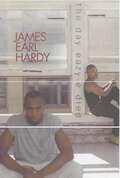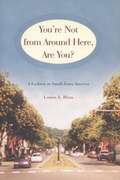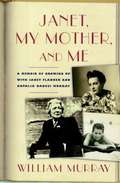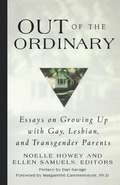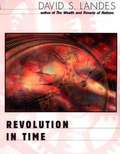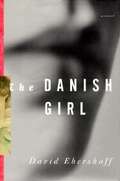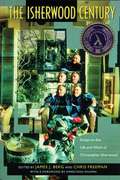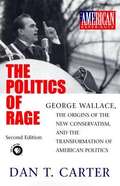- Table View
- List View
The Day Eazy-e Died (B-boy Blues Ser. #4)
by James Earl HardyAt the end of If Only for One Nite, Raheim Rivers and Mitchell Crawford's love had been tested by ghosts of the past; now it will be tested by the haunting specter of AIDS. As Raheim juggles his increasingly hectic schedule as a supermodel, he is rocked by the news that one of his idols, NWA founder Eazy-E, has AIDS. His complacency shattered, Raheim gets tested for HIV but keeps it a secret. Meanwhile, life goes on around him as his son struggles in a new school, his ex-girlfriend falls in love with a new man, and Mitchell becomes increasingly concerned about Raheim's withdrawal. As he has done so successfully in the past, Hardy masterfully draws his fascinating and very real characters into the ferment of urgent societal issues. He has created a powerfully honest look at the issues facing young people of all sexual persuasions, particularly young Black men, who are disproportionately infected with or affected by HIV. As the date for disclosure of his test results draws near, Raheim's fear and the ongoing stigma of AIDS pus him toward conflicting decisions.
The Evening Crowd At Kirmser's: A Gay Life In The 1940s
by Ricardo Brown William Reichard Allan H. SpearSet in 1945-1946, documentary of a WWII vet discharged for homosexuality and gay life at the time period.
The Scarlet Professor: A Literary Life Shattered by Scandal
by Barry WerthStory of a literary critic destroyed by inuendo.
You're Not from Around Here, Are You: A Lesbian in Small-Town America
by Louise A. BlumThis is a funny, moving story about life in a small town, from the point of view of a pregnant lesbian. Louise A. Blum, author of the critically acclaimed novel Amnesty, now tells the story of her own life and her decision to be out, loud, and pregnant. Mixing humor with memorable prose, Blum recounts how a quiet, conservative town in an impoverished stretch of Appalachia reacts as she and a local woman, Connie, fall in love, move in together, and determine to live their life together openly and truthfully. The town responds in radically different ways to the couple’s presence, from prayer vigils on the village green to a feature article in the family section of the local newspaper. This is a cautionary, wise, and celebratory tale about what it’s like to be different in America—both the good and the bad. A depiction of small town life with all its comforts and its terrors, this memoir speaks to anyone who has ever felt like an outsider in America. Blum tells her story with a razor wit and deft precision, a story about two "girls with grit," and the child they decide to raise, right where they are, in small town America.
A Density Of Souls
by Christopher RiceSet in New Orleans; four high school friends torn apart by secrets and violence; five years later more secrets discovered.
A Man's Reach
by Elmer L. Andersen Lori SturdevantAutobiography of the popular Minnesota Governor in the 1950's.
Afterimage
by Helen HumphreysIN THE TURBULENT WORLD OF VICTORIAN ENGLAND, A MAID, MISTRESS, AND MASTER ARE DRAWN INTO A FATEFUL LOVE TRIANGLE.
Janet, My Mother, and Me: A Memoir of Growing Up With Janet Flanner and Natalia Danesi Murray
by Williamson MurrayJanet, My Mother, and Me is a charming, captivating memoir about a boy growing up in a household of two extraordinary women. William Murray was devoted to his mother, Natalia Danesi Murray, and to his mother's longtime lover, writer Janet Flanner. Even as a teenager, he accepted their unconventional relationship. His portrait of the two most important people in his life is unforgettable. Janet Flanner was already celebrated as the author of a new style of personal journalism for her "Letter from Paris" in The New Yorker when she met the Italian-born Natalia Murray on Fire Island, New York, in 1940. Their encounter, writes William Murray, was a "coup de foudre, a thunderbolt that instantly sent them rushing into each other's arms and forever altered their lives, as well as mine." Murray was already growing up in two cultures on different continents, in New York and Rome, when his mother's life changed so dramatically. He quickly accepted Flanner and the unusual household in which he found himself. (Natalia's mother, Mammina Ester, also lived with them in New York.) His memories of the women and of his own boyhood and adolescence are touching and often hilarious. Janet, My Mother, and Me offers a look at the world in which gay professional women moved in the decades before such relationships became more open and accepted. Murray's mother was a publishing executive and a broadcaster, and Murray, who originally hoped to become an opera singer and trained for that profession, eventually moved into the professions of both his mother and Flanner, becoming a novelist and then for many years an editor and writer at The New Yorker. This is an exuberant, warm, and often poignant memoir with a memorable cast of characters. Beguiling and unusual, it will remain vivid in readers' minds for years to come.
Just A Mom
by Betty DegeneresThe mother of comedian Ellen DeGeneres explains ways parents can help themselves and their homosexual children to deal with homosexuality.
Losing Matt Shepard: Life and Politics in the Aftermath of Anti-Gay Murder
by Beth LoffredaThe infamous murder in October 1998 of a twenty-one-year-old gay University of Wyoming student ignited a media frenzy. The crime resonated deeply with America's bitter history of violence against minorities, and something about Matt Shepard himself struck a chord with people across the nation. Although the details of the tragedy are familiar to most people, the complex and ever-shifting context of the killing is not. Losing Matt Shepard explores why the murder still haunts us -- and why it should. Beth Loffreda is uniquely qualified to write this account. As a professor new to the state and a straight faculty advisor to the campus Lesbian Gay Bisexual Transgender Association, she is both an insider and outsider to the events. She draws upon her own penetrating observations as well as dozens of interviews with students, townspeople, police officers, journalists, state politicians, activists, and gay and lesbian residents to make visible the knot of forces tied together by the fate of this young man. This book shows how the politics of sexuality -- perhaps now the most divisive issue in America's culture wars -- unfolds in a remote and sparsely populated area of the country. Loffreda brilliantly captures daily life since October 1998 in Laramie, Wyoming -- a community in a rural, poor, conservative, and breathtakingly beautiful state without a single gay bar or bookstore. Rather than focus only on Matt Shepard, she presents a full range of characters, including a panoply of locals (both gay and straight), the national gay activists who quickly descended on Laramie, the indefatigable homicide investigators, the often unreflective journalists of the national media, and even a cameo appearance by Peter, Paul, and Mary. Loffreda courses through a wide ambit of events: from the attempts by students and townspeople to rise above the anti-gay theatrics of defrocked minister Fred Phelps to the spontaneous, grassroots support for Matt at the university's homecoming parade, from the emotionally charged town council discussions about bias crimes legislation to the tireless efforts of the investigators to trace that grim night's trail of evidence. Charting these and many other events, Losing Matt Shepard not only recounts the typical responses to Matt's death but also the surprising stories of those whose lives were transformed but ignored in the media frenzy.
Men on Men 2000: Best New Gay Fiction for the Millennium (Men on Men, No #8)
by Karl Woelz David BergmanThis is the eighth book in a series of fiction anthologies
No More Heartburn
by Sherry A. RogersAQdvice by a physician about long-range techniques for avoiding heart-burn.
Out of the Ordinary: Essays on Growing Up with Gay, Lesbian, and Transgender Parents
by Noelle Howey Ellen SamuelsAn insightful and touching collection of real life experiences of children in the 1970 and 1980's before the level of acceptance for gay, lesbian and transgendered family's had developed. They each touch on their struggles and the secrecy they often had to keep along with the life lessons of human understanding and pride that often came from those challenges. The book also includes references and resources for additional reading and support.
Reading By Touch: Trials, Battles, and Discoveries
by Pamela LorimerHistory of reading for the blind.
Revolution in Time: Clocks and the Making of the Modern World (Revised and Enlarged Edition)
by David S. LandesMore than a decade after the publication of his dazzling book on the cultural, technological, and manufacturing aspects of measuring time and making clocks, David Landes has significantly expanded Revolution in Time. In a new preface and scores of updated passages, he explores new findings about medieval and early-modern time keeping, as well as contemporary hi-tech uses of the watch as mini-computer, cellular phone, and even radio receiver or television screen. While commenting on the latest research, Landes never loses his focus on the historical meaning of time and its many perceptions and uses, questions that go beyond history, that involve philosophers and possibly, theologians and literary folk as well.
The Danish Girl: A Novel
by David EbershoffAuthor's Note: This is a work of fiction loosely inspired by the case of Einar Wegener and his wife. I wrote the novel in order to explore the intimate space that defined their unusual marriage, and that space could only come to life through conjecture and speculation and the running of imagination. Some important facts about Einar's actual transformation lie in these pages, but the story, as recounted here with its details of place and time and language and interior life, is an invention of my imagination. In early 1931 when the news broke that a man had changed his gender, newspapers around the world ran accounts of Einar Wegener's remarkable life. (It is interesting to note that Lili Elbe herself leaked the story to the press, and wrote some stories about herself, including her own obituary, under a pseudonym.) Many of those articles were helpful in writing this novel, especially those in Politiken and other Danish newspapers. Another indispensable source was Lili Elbe's diaries and correspondence, which Niels Hoyer edited and published as Man Into Woman. Those journal entries and letters provided critical factual details of Einar's evolution, especially regarding Lili's first visit to Wegener's studio, Einar's mysterious bleeding and physical decline, and his journey to and stay at the Dresden Municipal Women's Clinic. The passages in my book that deal with these incidents are especially indebted to Hoyer's assemblage of Lili Elbe's original words. Nonetheless, I have changed so many elements of Einar Wegener's story that the characters in these pages are entirely fictional. The reader should not look to this novel for very many biographical details of Einar Wegener's life, and no other character in the novel has any relation to an actual person, living or dead.
The Girls: Sappho Goes To Hollywood
by Diana MclellanMcLellan's investigative account of the lives of Hollywood's most glamorous and uninhibited goddesses plunges deep into the rich stew of love, money, and passion that was the dawn of the movie business. The Girls reveals an early marriage to a communist spy that Marlene Dietrich fought all her life to keep secret and unearths an equally shrouded fling between Dietrich and Greta Garbo as starlets in Berlin. From the complex love life of the elegant Mercedes de Acosta through Isadora Duncan and Tallulah Bankhead to Garbo's lover Salka Viertel, McLellan untangles a passionate skein of connections that stretches from the theater in New York through brazenly bisexual socialites deep into the heart of the film industry.
The Isherwood Century: Essays on the Life and Work Of Christopher Isherwood
by Chris Freeman James J. BergCalled “the best English prose writer of this century” by Gore Vidal, Christopher Isherwood is best known for Goodbye to Berlin—the inspiration for the musical Cabaret—but is also the author of plays, novels, and diaries. The Isherwood Century gathers twenty-four essays and interviews offering a fresh, in-depth view of Isherwood, his literary legacy, and his continuing influence as both a literary and a gay pioneer.
The Politics of Rage: George Wallace, the Origins of the New Conservatism, and the Transformation of American Politics
by Dan T. CarterCombining biography with regional and national history, Dan T. Carter chronicles the dramatic rise and fall of George Wallace, a populist who abandoned his ideals to become a national symbol of racism, and later begged for forgiveness. In The Politics of Rage, Carter argues persuasively that the four-time Alabama governor and fourtime presidential candidate helped to establish the conservative political movement that put Ronald Reagan in the White House in 1980 and gave Newt Gingrich and the Republicans control of Congress in 1994. In this second edition, Carter updates Wallace's story with a look at the politician's death and the nation's reaction to it and gives a summary of his own sense of the legacy of "the most important loser in twentieth-century American politics."
The Secret Handshake: Mastering the Politics of the Business Inner Circle
by Kathleen Kelley ReardonOffers invaluable advice on such career-building tactics and skills as getting noticed, networking, persuading others, knowing which battles to fight, and mastering the art of the quid pro quo.
